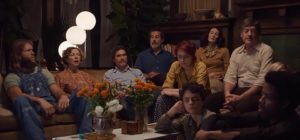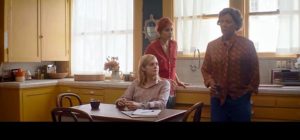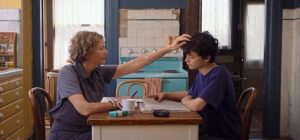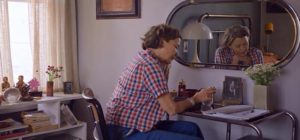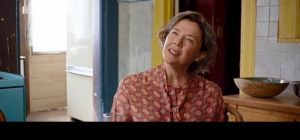When I review films, I often give my highest praise to the ones that leave me with a lot to unpack both on an ideological and a visual level. And that’s just because, as my favorite special child of all the art forms (please don’t tell Music), I have seen its incredible potential. Film has the power to convey just about any idea, concept, principle, theme and theory a human brain can conceive of, and lord know that Mike Mills’ effervescently literate coming-of-age dramedy 20th Century Women has plenty of heady ideas to share; its own ideas and the ideas of various feminist scholars, ex-Presidents and Henry Rollins-led hardcore bands. But all the same, 20th Century Women is as fine an opportunity as any to remind myself that a great film can be about more than just how stimulating its insights are. When I think about what Mike Mills (taking the lovely humanism of Beginners and losing most of what made that fine film at times pretentious) has accomplished here, it’s not just the breathlessly smart dialogue about feminism, punk music, and the end of the 1970s that lands it on my list. In fact far from “just” that quality, I might be so bold as to say it is not that at all that makes it a proud entry in my top twenty films. After I chew over the film’s terrific ideas, the aftertaste that really stays with me is a more simple, emotional sense. It is the feeling Roger Ebert spoke of when, having walked out of Almost Famous, he felt a desire to hug himself. After walking out of 20th Century Women, I had not only a desire to hug myself, but a wish to walk back in the theater, somehow find those characters still standing in there among the discarded popcorn boxes, and hug each and every one of them. True, 20th Century Women probably could have landed on my list just on the strength of its verbiage, but it is even more essential that those wonderful words come out of the minds and mouths of funny, lovably fallible, and impeccably acted characters. More than any other film outside of my top ten, 20th Century Women is probably the best representative of that often deceptively modest brand of film that I have always unabashedly loved: the character study. Because for as much as I love scripts full of eloquence and poetry and philosophy, there really is no substitute for the heady magic of having “met” characters you love for the first time and feeling a full heart at the thought of returning to them again. For example, I adore the serenely beautiful language of a film like Before Sunset, but the real reason I return to that enchanting world again and again and again is that Celine and Jesse live there. It is the same way with 20th Century Women. The warm, witty, and yearning dialogue certainly helps to make the world of the film as intoxicating as it is, but that place would feel empty without such likable, lively, and unmistakably human characters making their home inside of it.
The home in question can be found near the beaches of sunny Santa Barbara in the year 1979. Before we learn anything else, we learn that 20th Century Women is, in essence, a period piece. Better yet, it is that exquisitely subtle kind of period piece that makes you feel like you are in the time period without making a showy fuss about it. Its understated feel for a specific decade puts it in proud company with the graceful evocations of the 1960s and 1980s in films like Inside Llewyn Davis and We Are the Best!, and, like those two films, the music of its temporal setting plays a major role in setting the scene. Most of the film’s scenes take place in a two-story house where a free-spirited but pragmatic single mother named Dorothea (brilliantly played by Annette Bening) is attempting to raise her fifteen year-old son, Jamie (Lucas Jade Zumann, in one of the most confidently relaxed newcomer performances I have seen in some time). The house is also home to two other tenants. One is an earthy, yoga-practicing handyman played by Billy Crudup. A gentle soul, he is the kind of person who is often full of shit, but always agreeably so. It comes as no surprise when we learn he likes to spend his free time sculpting his own clay bowls. The other tenant is Abbie, a woman in her late twenties who is recovering from cervical cancer and who finds solace in Talking Heads records and taking photographs for art installations. The unofficial third tenant is Julie, a moody, sardonic seventeen year-old, who frequently scales the scaffold up to Jamie’s bedroom, so the two can spend the night conversing and chastely cuddling. The film is very much about meeting and existing alongside these very three-dimensional people, but the film does have a central plot that gives it just enough momentum. One day Jamie, at the urging of his skater friends, performs a stunt that momentarily cuts off one’s breathing, and ends up in the hospital. Mortified at her son’s recklessness, Dorothea suddenly begins to worry that her guidance may alone may not be enough to usher Jamie into a reasonably well-adjusted adulthood. She decides to calls on Abbie and Julie to spend extra time with him and tells them to share with him all the wisdom their tender years have given them. And, while much happens from there, that is really the crux of what you need to know about the film as you sit down to view it. Once upon a time in the 1970s, in Santa Barbara, there was a house full of smart, fallible, good-natured people who cared about each other a lot, and who all did what they could to help the youngest of them come of age with as much grace and unconditional love as possible. Much interesting conflict spills forth from there, but that sense of decency and compassion is always the film’s true north, and it ensures that kindness and good humor infuse even the saddest of its passages.
20th Century Women is the kind of film that revels in the simple, heartfelt joy of creating a rich, nuanced community of people, which it observes with palpable affection and occasional bemused concern. Its approach is simple, but there is an ocean of depth to that simplicity. As soon as I watched Dorothea tell the other characters what she needed from them in that kitchen, a smile spread across my face. Something about that simple declaration of purpose, both for the characters and for the film, made me realize right then and there that I was in very good hands. I knew I would love the film because I knew that characters who already felt impossibly rich and true not even a quarter of the way into it were going to spend the next ninety minutes or so just speaking with one another and interacting and relating to each other and revealing new layers of themselves. The film had spent its opening introducing me to a small, perfectly realized community and it now declared in a soft, warm, and assured tone that it was going to spend the rest of that time deepening those relationships even further. And I knew that, by the end, I would feel like I was now a part of that tiny world. It is the quiet genius of Mills’ approach that, just as Dorothea wants Jamie to listen to the women around him, the film in turn wants us to stand with Jamie as surrogates and to listen to their stories. Because, let me be absolutely clear, 20th Century Women holds a bright, beautiful torch for the axiom that women are people and that society becomes healthier when it pays attention to them. Dorothea knows that it will do Jamie a world of good to listen to, and converse with, the women in his life, and Mills implies that it is good for the whole lot of us. 20th Century Women, on its face, is a story about how it takes a village to raise a child, but it gently subverts that trope by paying even more attention the village than to the child and by having three women (and the occasional encouragement of a hilariously tranquil Billy Crudup) assume the role of the village.
In fairness, Jamie is actually a wonderful, interesting character in his own right and the film is more interesting for not making him a total cipher, if only because it enriches the female characters to watch someone genuinely responding to them and processing the knowledge they have to give. Still, Mike Mills wisely makes sure that Jamie, his autobiographical avatar, is only the fourth most important character in the film. Because, if it isn’t clear from the title, Mike Mills’ autobiography is not really the story of Mills at all, but his attempt to give something back to the women who raised him. 20th Century Women is a film about women existing at a time of great change, for the country about to elect Ronald Reagan and for a society of women fighting to have their voices heard, respected, and valued. And here I have to give credit to Mike Mills for knowing what he needed to do to make this kind of film: let the women take center stage. A middle-aged white man making a film about how much he learned from the women in his life could have ended up feeling patronizing or at the very least piously self-congratulatory, but Mills does right by his female protagonists by making sure 20th Century Women is a story driven by the personalities and souls of its female characters. To go back to what I spoke of before, placing character development above ideas doesn’t just happen to work for the film. It turns out to be the exact right way to tell the story because the story’s entire purpose is to listen to women. And that simple act of just letting them be heard is more important than whatever they happen to be speaking of in any given scene, whether its feminist politics, sex, or the difference between Talking Heads and Black Flag. 20th Century Women is a vibrant, aching, and clever salute to some women in 1970s Santa Barbara, and it salutes the complexity and compassion of women around the world by extension. Mike Mills conjures up a beautiful symphony of female voices and he avoids reducing the struggle of being a woman to some simplistic moral. In a sly, observant take on Mills’ own role in this story, he has his younger self read a feminist text to his mother, explaining how society marginalizes older women. Dorothea thinks for a moment and then reminds him that no amount of essays will ever make him fully understand her. The lesson Jamie learns is that every woman has her own unique story and that the key to empathy lies in listening to each new woman you meet as if you have never heard it. Because, of course, you haven’t.
But, to reiterate, the genius of 20th Century Women is really just that it leads by example. Dorothea decides that the best medicine for making sure her son grows into a good person is to just be around her and Abbie and Julie and Mike Mills prescribes us the very same tonic. He sits us down to listen to these beautifully shaded characters and in so doing he entrusts the film to its real authors: three phenomenal actresses, each from a different generation and each giving what could be the best work of their respective careers. Elle Fanning is not yet nineteen years old as of this writing and the character of Julie finds her in control of a sharp sense of comic timing that goes hand in hand with her ability to convey dramatic pathos. 20th Century Women is the kind of film where you might find yourself smiling just for a second in the middle of a sad scene and Fanning has an uncanny knack for playing multiple emotions at once. Julie is, in many ways, the film’s toughest role because it requires Fanning to dance around the cliche of the troubled, rebellious, sexually liberated teenager while never tumbling headlong into it. Fanning’s face holds notes of apathy and desperation to somehow pierce beyond her own bored ennui. Her character belongs to a long line of promiscuous iconoclasts, but she also displays a bemused self-awareness. She realizes that she has become something of a dissatisfied youth stereotype, at least to an outsider’s eye, but she is young and her experiments with men and booze and pot are the best idea she has for how to process her pain and confusion. The daughter of a therapist, she has the tools to scrutinize her own decisions relentlessly, but they are still the decisions she most wants to make at this time in her life. Greta Gerwig is an utter revelation as Abbie, a twenty-something visual artist recovering trying to come to terms with her brush with disease and the fact that she may never be able to have children of her own. Gerwig is one of my absolute favorite of modern actresses, and she has been brilliant in film like Frances Ha and Mistress America. Still those films, both from director Noah Baumbach, played on Gerwig’s talent for taking oblivious immaturity to its most graceful and nuanced point. Abbie feels distinctly different from past Gerwig performances. She is complex but also more straightforward in some ways. Abbie is in an emotional freefall, but she is also someone with a better sense of who she is and what she wants. There is no veil of irony or archness to shield Abbie as she nakedly processes how cruelly life can disrupt our best laid plans. Gerwig gets to play the film’s most devastating scenes and its funniest scenes as well (as when she coaches an entire dinner table on how to say “menstruation” without flinching), and she approaches every scene in the film with a sense of unguarded sincerity. Finally, there is Annette Bening’s Dorothea, which I am increasingly coming to think is the best work of her long, wonderful career. Mike Mills may have made his film for all women but it holds a special place in its heart for mothers. If 20th Century Women is a film about the complexities of womankind, then Dorothea is clearly its proper protagonist. She compels Jamie to continually question the mores of the world he will soon join, but she also wrestles with her own biases and the fact that it just gets harder to keep an open mind about every little thing as we age. She insists on accompanying Abbie to a punk club to see the musicians her son idolizes but she turns in early, knowing she will never be able to relate to the angry, inarticulate noise on stage. She reminds Jamie to stay aware of how his identity as a man gives him preferential treatment in an unjust system, but she is also leery about the more radical feminist ideas in the books that Abbie gives Jamie to read. 20th Century Women is a film about the ways in which the experience of being a woman had evolved by 1979, and Bening’s thoughtful, warm, prickly, quick-witted, intermittently exasperated, and ever self-probing Dorothea is the character who is most aware of just how much had changed by that time. Dorothea is a woman who is proud of her years of experience but also knows better than anyone the value of not letting one’s assumptions go unchecked. Watching the dance between her keen intelligence and her lovely humility was one of the most genuinely funny and emotionally nourishing experiences I had all year.
20th Century Women is a great feminist film because I takes the lesson that women are people and then applies the show-not-tell principle. Women are people, and here are three fantastic women speaking witty, soulful dialogue, and portrayed by three of the best actresses from three different generations. Mike Mills thanks the women in his life for everything they did for him, but his final gift is to actually treat the film like a gift and not make it about himself. 20th Century Women is about this lovely, urbane group of women and how entertainingly enriching it is to spend two hours getting to know them. At the film’s end, Mike Mills admits that fully capturing the tangle of emotions, ideas and desires that made up his mother would be an impossible feat. Women are people and a person is too wild a thing to be summed up and neatly defined. It is no secret that Hollywood still needs to do a much better job of telling women’s stories and the reason for that is not simply that we would all be better for hearing them, though I do believe that we would be. We need more films about women because it’s just the right thing to do. It’s the right thing to do because film is an invaluable tool for helping us connect to humanity and women comprise more than half of what humanity literally means. I adored this film because I met a house full of great, great characters. They were smart, soul-searching, passionate and funny and, as with any great character study, I am excited to visit these people again in the years to come. They feel like real people to me now. And it means a lot that these real people are women.


